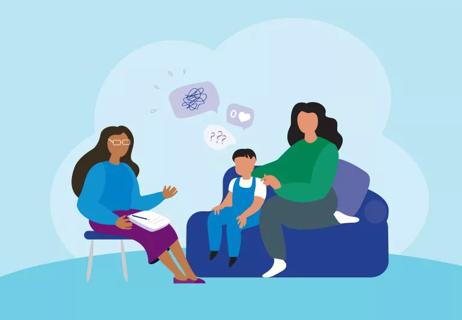An expert explains what to look for

It’s not unusual to have a complicated relationship with your parents. Just like you, your parents are only human, subject to the same reactions and emotions. But where’s the line between familial bickering and toxic behavior?
Advertisement
Cleveland Clinic is a non-profit academic medical center. Advertising on our site helps support our mission. We do not endorse non-Cleveland Clinic products or services. Policy
Recognizing that you have a toxic parent – and that you may be parroting that behavior – can be harder than realizing a friend or colleague is toxic. Because they’re your parents, you want to give them the benefit of the doubt. And because you’ve been around their behavior your entire life, it can be hard to tell what’s negative and what’s positive.
But there are ways you can tell if your parents’ behavior is toxic. And as emotionally taxing as it may be, there are ways to cope. To get a better idea of what to look for and how to handle your boundaries, we spoke with psychologist Chivonna Childs, PhD.
A toxic parent, says Dr. Childs, is a parent that puts their needs before their child. “They’re more self-centered than other-centered,” she adds. Coupling these with other traits can give you a good idea of whether or not your parent or parents are toxic.
“Any time you think a person is toxic, you look at their behavior. Those traits can belong to our parents as well,” she adds. “Those are signs of toxic people. Our parents are individuals, they’re people. They just happen to be our parents.
Dr. Childs says these are traits to look for if you believe you may have toxic parents:
Advertisement
Toxic parenting can have a devastating effect on a child in both the short and long term.
One of the biggest short-term consequences for a child who is the victim of toxic parenting is a constant feeling of being trapped. “Whether it’s physical, verbal or emotional abuse, you feel trapped if you’re a child,” Dr. Childs says. “It’s not like a child can just get up and leave, to go live on their own. You’re left at the mercy of the people who love and take care of us.”
Even more disturbing are the long-term effects toxic parenting can have on a child. “Your parents are your introduction to the world,” notes Dr. Childs. “We think what we see in their behavior is normal until you’re 5 or 6 years old.”
If you’re the child of toxic parents, she says, it’s only then that you’re old enough to realize that perhaps that toxic behavior isn’t normal. By that point, though, much of the damage has been done.
“These are learned behaviors that we can continue to perpetuate on others as well as our own children,” she adds. “If you’re raised thinking that toxic behavior is normal, then you’ll think that’s how you’re supposed to behave with your children, too.”
It can damage relationships outside your family, too. “If we don’t understand how to treat people and how to be in reciprocal relationships, where there’s a give and take, then it can spread beyond your family, too,” she adds.
It can be difficult to realize you’re the victim of toxic parenting as a child. But as you get older, you may recognize more and more that what you experienced wasn’t normal. At that point, it’s important to get help, to get treatment, to heal yourself and break the cycle.
“Seeking help is important,” says Dr. Childs. “Find a good therapist who can help you process your feelings and emotions. Determine who you want to be and actively make changes.”
Change is possible, she adds. “You don’t have to be a product of your environment. It’s important to understand that you can heal and change.”
Realizing you can heal and change is important, Dr. Childs says, but so is setting boundaries. “Parent’s don’t suddenly change and become nontoxic. You may have to distance yourself from them to heal and that can be a hard pill to swallow,” she says.
But, she adds, setting boundaries is exactly what you would do with any other toxic person in your life, so it should be the same with family. “We have to let them know what’s appropriate and what’s not because boundaries will help you heal.”
It can be difficult, too, she says, because toxic people often don’t like it when boundaries are set. And while setting boundaries with people outside the family can be hard, setting boundaries with parents can be harder. “Parents are the most difficult boundaries because they gave birth to you, they know what buttons to push,” she points out.
Advertisement
Talking to a trusted friend as you set those boundaries can help give you the necessary emotional support and motivation to stick to your new boundaries. “They will become upset but that means it’s working,” Dr. Childs says. “If they can’t respect those boundaries, we have to love them from a distance. That allows us to be free from their toxicity.”
Part of the healing process, according to Dr. Childs, is also focusing on yourself. With boundaries set and a support system in place, you can truly look at how you want to change and move forward. “You have to recognize this is not your fault and you can change, you can work on being better and being the person you truly want to be,” she says.
“If you don’t like something about yourself,” she adds, “you can sit, reflect on who you are, reflect on the characteristics of yourself you love and focus on what you think needs improvement. And recognize that you are not your parents.”
Advertisement
Learn more about our editorial process.
Advertisement

The family can accomplish more by doing less

Celebrate individuality, create opportunities for cooperation, and stay calm and in control

Be involved in your kid’s care, but be mindful of boundaries

Most recommended precautions center around minimizing bruising or swelling

Even one drink can have an impact on your cognitive function leading to slurred speech, blurred vision and impaired memory

Understand who may (and may not) benefit

Type 2 diabetes isn’t inevitable with these dietary changes

Applying a hot or cold compress can help with pain